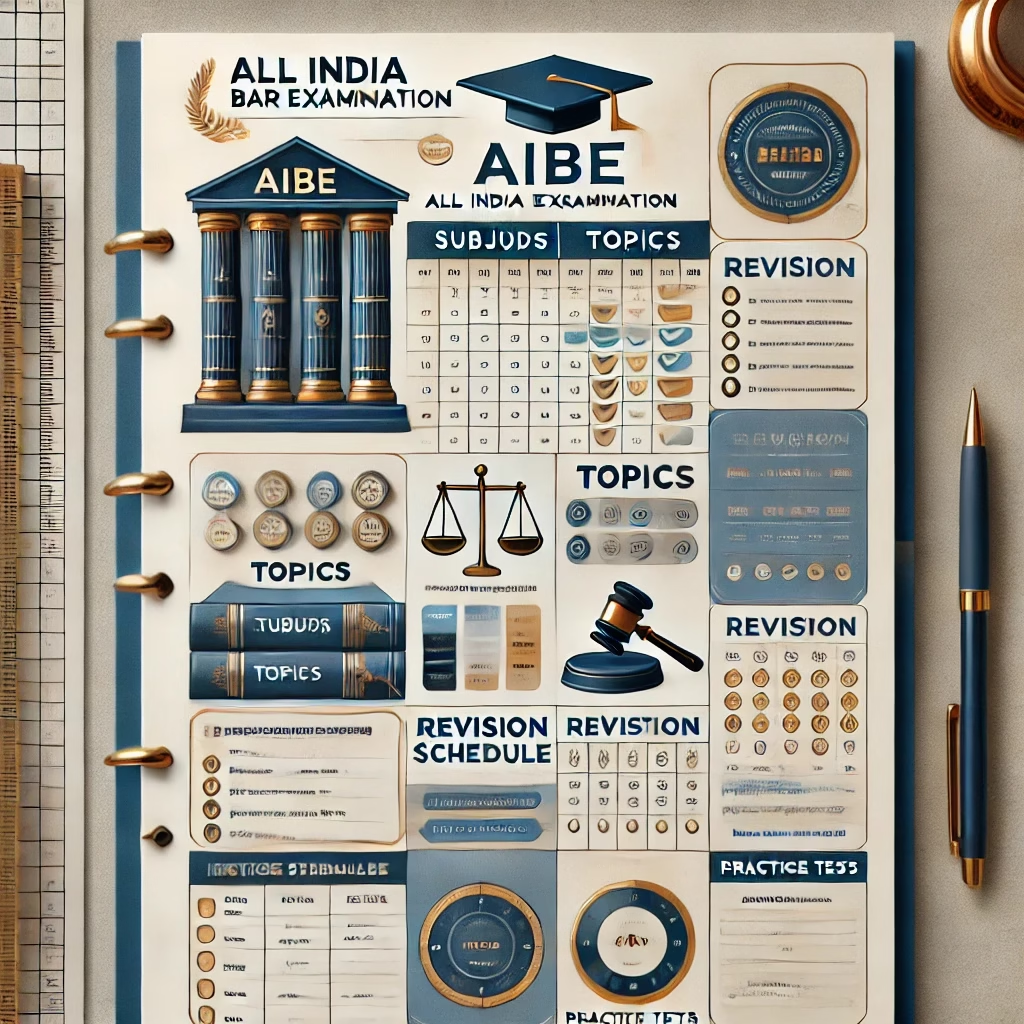The All India Bar Examination (AIBE) stands as a crucial milestone for law graduates across India. As a mandatory certification exam conducted by the Bar Council of India (BCI), AIBE determines whether law graduates can practice in courts throughout the country. With the recent declaration of AIBE 19 results on March 21, 2025, aspiring lawyers nationwide are either celebrating their success or preparing for their next attempt. In this comprehensive guide, we’ll walk you through everything you need to know about AIBE India, from its purpose and eligibility criteria to exam pattern, preparation strategies, and beyond.
Understanding AIBE: Purpose and Significance
The All India Bar Examination (AIBE) was introduced by the Bar Council of India in 2010 as a standardized test to assess the basic knowledge and capability of law graduates to practice law in India. This national-level certification examination serves multiple important purposes:
Legal Practice Certification
AIBE’s primary purpose is to ensure that only qualified and competent individuals enter the legal profession. Upon passing this exam, candidates receive a Certificate of Practice (CoP), which is mandatory for practicing law in any court across India. Without this certificate, law graduates cannot represent clients in courts despite having completed their legal education.
Quality Control Mechanism
The examination serves as a quality control mechanism for the legal profession, ensuring that practicing lawyers possess adequate knowledge of substantive and procedural law. This helps maintain high professional standards within the legal community and protects the interests of clients seeking legal representation.
Uniform Assessment Standard
AIBE India provides a standardized assessment method for law graduates from different universities and institutions across the country, creating a level playing field regardless of where you obtained your law degree. This uniformity ensures that all practicing lawyers meet a minimum threshold of legal knowledge and competence.
Professional Competence Verification
By testing candidates on various legal subjects, the exam verifies that aspiring lawyers have the fundamental knowledge required to represent clients effectively and ethically. This comprehensive assessment covers everything from constitutional law and criminal procedure to professional ethics and alternative dispute resolution.
Eligibility Criteria for AIBE India
To appear for the AIBE, candidates must fulfill specific eligibility criteria set by the Bar Council of India. Understanding these requirements is essential before applying for the examination:
Educational Qualification
Candidates must have completed either a 3-year LLB program after graduation or a 5-year integrated LLB degree from a recognized law institution in India. The law degree must be obtained from a law school or university that is recognized by the Bar Council of India (BCI).
Enrollment with State Bar Council
Prior to applying for AIBE India, candidates must be enrolled with their respective State Bar Council. They must possess a valid enrollment certificate issued by their State Bar Council, which serves as proof of their eligibility to practice law after passing the AIBE.
No Minimum Marks Requirement
There is no specific minimum percentage of marks required in the qualifying law degree to appear for AIBE. This means that candidates with any percentage in their law degree can apply for the examination, provided they meet the other eligibility criteria.
No Age Limit
The BCI has not prescribed any upper or lower age limit for appearing in the AIBE India exam. This allows candidates of all age groups to pursue their dream of practicing law in India.
No Limit on Attempts
There is no restriction on the number of attempts for AIBE. Candidates can appear for the exam multiple times if they fail in previous attempts. This flexibility ensures that candidates have ample opportunities to qualify for the examination.
Nationality
Only Indian nationals are eligible to appear for the AIBE exam, as the certification is specifically designed for practice within the Indian legal system.
AIBE Exam Pattern and Structure
Understanding the exam pattern is crucial for effective preparation. The AIBE follows a specific structure designed to test various aspects of legal knowledge:
Exam Mode
AIBE is conducted in offline mode (pen and paper-based). It’s important to note that AIBE is no longer an open-book examination, a change that was implemented in 2021. This shift has significantly altered the preparation strategy for many candidates.
Exam Duration

The examination duration is 3 hours (typically from 10 AM to 1 PM). This limited time frame requires candidates to be well-prepared and efficient in answering questions.
Question Format
The question paper contains 100 multiple-choice questions (MCQs). Each question carries 1 mark, making the total exam worth 100 marks. These questions are designed to test the candidate’s knowledge across various legal subjects.
Marking Scheme
One mark is awarded for each correct answer. There is no negative marking for incorrect answers, which means candidates can attempt all questions without fear of penalty for wrong answers.
Language Options
AIBE offers flexibility in terms of language choice. The exam is available in multiple languages including English, Hindi, and 22 vernacular languages such as Bengali, Gujarati, Marathi, Tamil, Telugu, Kannada, Punjabi, Assamese, and more. This linguistic flexibility makes the exam accessible to candidates from diverse backgrounds.
Passing Criteria
For General/OBC category candidates: 45% marks (45 out of 100)
For SC/ST and disabled candidates: 40% marks (40 out of 100)
For AIBE 19, it’s worth noting that seven questions were withdrawn from each set, reducing the total to 93 questions. Accordingly, the passing marks were adjusted to 42 for General/OBC candidates (45% of 93) and 37 for SC/ST and disabled candidates (40% of 93).
AIBE Syllabus and Subject Weightage
The AIBE syllabus is comprehensive, covering various aspects of law. Understanding the subject-wise weightage can help you prioritize your preparation:
Constitutional Law
- Fundamental Rights and Duties
- Directive Principles of State Policy
- Union and State Executive
- Parliament and State Legislatures
- Judiciary
- Emergency Provisions
- Amendment of the Constitution
Constitutional Law typically accounts for 10-12 questions in the exam, making it one of the highest-weighted subjects.
Criminal Law
- Indian Penal Code
- Criminal Procedure Code
- Principles of Criminal Liability
- Stages of Crime
- Group Liability
- Defenses
This subject also carries significant weight, with approximately 10-12 questions.
Civil Procedure Code and Limitation Act
- Jurisdiction
- Res Judicata
- Pleadings
- Execution
- Appeals, Reference, Review, and Revision
- Limitation Periods
CPC and Limitation Act together account for around 8-10 questions.
Contract Law
- Formation of Contract
- Void and Voidable Agreements
- Performance and Discharge
- Remedies for Breach
- Special Contracts
Contract Law typically comprises 8-10 questions in the exam.
Law of Torts
- General Principles
- Specific Torts
- Defenses
- Remedies
Torts usually accounts for 6-8 questions in the AIBE.
Family Law
- Marriage and Divorce
- Maintenance
- Adoption and Guardianship
- Succession
Family Law is an important subject with approximately 8-10 questions.
Property Law
- Transfer of Property Act
- Easements
Property Law typically comprises 6-8 questions.
Evidence Law
- Relevancy
- Admissibility
- Burden of Proof
- Presumptions
- Examination of Witnesses
Evidence Law accounts for about 6-8 questions.
Administrative Law
- Principles of Natural Justice
- Judicial Review
- Administrative Tribunals
This subject comprises approximately 4-6 questions.
Company Law
- Incorporation
- Management
- Winding Up
Company Law typically accounts for 4-6 questions.
Environmental Law
- Basic Principles
- Environmental Protection Act
Environmental Law comprises around 3-5 questions.
Professional Ethics
- Bar Council of India Rules
- Contempt of Court
Professional Ethics is an important subject with approximately 5-7 questions.
Alternative Dispute Resolution
- Arbitration
- Conciliation
- Mediation
- Negotiation
ADR typically accounts for 3-5 questions.
AIBE Registration Process
The registration process for AIBE involves several steps. Understanding this process thoroughly will help you avoid any complications:
Step 1: Online Registration
Visit the official AIBE India website (allindiabarexamination.com)
Create a new account by clicking on “New Registration”
Fill in your personal details, educational qualifications, and State Bar Council enrollment information
Upload the required documents (photograph, signature, enrollment certificate)
Submit the registration form
Step 2: Fee Payment
After successful registration, proceed to pay the examination fee
Fee amount:
- General/OBC category: INR 3,560
- SC/ST category: INR 2,560
Payment can be made online using credit/debit cards, net banking, or UPI
Step 3: Application Form Submission
After fee payment, complete and submit the application form
Take a printout of the completed application form for future reference
Step 4: Correction Window
The BCI typically provides a window for making corrections in the application form
Check the official website for announcements regarding the correction window
Required Documents
For registration, keep the following documents ready:
- Scanned photograph (recent passport-sized)
- Scanned signature
- Bar Council enrollment certificate
- Law degree certificate
- Caste certificate (if applicable)
AIBE Exam Centers
The AIBE examination is conducted across various cities in India. Understanding the exam center allocation process is important:
Exam Center Selection
During the registration process, candidates can select their preferred exam center from the available options. The selection is typically on a first-come, first-served basis. Once a center reaches its maximum capacity, it will no longer be available for selection.
Number of Centers
AIBE is conducted in approximately 50+ cities across India. For AIBE 19, there were 53 exam cities throughout the country. Major cities include Delhi, Mumbai, Kolkata, Chennai, Bangalore, Hyderabad, Lucknow, Chandigarh, and Bhopal.
State-wise Distribution
The exam centers are distributed across different states to ensure accessibility for candidates from all regions:
- North India: Delhi-NCR, Chandigarh, Lucknow, Jaipur, Dehradun
- South India: Chennai, Bangalore, Hyderabad, Kochi, Coimbatore
- East India: Kolkata, Guwahati, Patna, Bhubaneswar
- West India: Mumbai, Pune, Ahmedabad, Nagpur, Indore
- Central India: Bhopal, Raipur, Jabalpur
- Northeast India: Shillong, Imphal, Agartala
Center Allocation
While you can select your preferred center, the final allocation is subject to availability. It’s advisable to register early to secure your preferred exam center, especially if you want to take the exam in a major city.
AIBE Admit Card Process
The admit card is a crucial document for appearing in the AIBE. Here’s everything you need to know about the AIBE admit card process:
Release Timeline
The AIBE admit card is typically released 2-3 weeks before the exam date. For AIBE 19, admit cards were released on December 15, 2024, for the exam scheduled on December 22, 2024.
Downloading Process
- Visit the official AIBE website
- Log in using your registration ID and password
- Click on the “Download Admit Card” option
- Verify all the details mentioned on the admit card
- Download and take a colored printout of the admit card
Important Details on Admit Card
The admit card contains several important details:
- Candidate’s name and roll number
- Photograph and signature
- Exam date and time
- Exam center name and address
- Reporting time
- Important instructions
Discrepancies in Admit Card
If you notice any discrepancies in your admit card, contact the AIBE helpdesk immediately. The helpdesk contact information is usually provided on the official website and the admit card itself.
Importance of Admit Card
The admit card is mandatory for entry to the exam hall. Without a valid admit card, candidates will not be allowed to appear for the examination. Candidates should preserve their admit cards even after the examination, as they might be required for future reference.
AIBE Result Declaration Process
After taking the examination, candidates eagerly await their results. Understanding the result declaration process will help manage expectations:
Result Timeline
The AIBE result is typically declared within 1-3 months after the examination. For AIBE 19, the exam was conducted on December 22, 2024, and the results were declared on March 21, 2025, approximately three months after the exam.
Provisional Answer Key
Before the final result, a provisional answer key is released. Candidates can raise objections to the provisional answer key within a specified timeframe. For AIBE 19, the provisional answer key was released on December 28, 2024.
Objection Window
After the provisional answer key is released, candidates can submit objections if they disagree with any answers. The objections must be submitted within the stipulated time. The Bar Council of India reviews all objections and makes necessary changes if required.
Final Answer Key
After reviewing the objections, the BCI releases the final answer key. The final result is prepared based on this answer key. For AIBE 19, the final answer key was published on March 6, 2025.
Result Checking Process
- Visit the official AIBE website (allindiabarexamination.com)
- Log in using your roll number and date of birth
- Click on the “Check Result” option
- Your result will be displayed, showing your score and qualifying status
- Download and save your scorecard for future reference
Passing Criteria
- General/OBC category: 45% marks (45 out of 100)
- SC/ST and disabled candidates: 40% marks (40 out of 100)
For AIBE 19, due to the withdrawal of seven questions, the passing marks were adjusted to 42 for General/OBC candidates and 37 for SC/ST and disabled candidates.
Certificate of Practice (CoP)
The Certificate of Practice is the ultimate goal of appearing for AIBE. Here’s everything you need to know about the CoP:
What is a Certificate of Practice?
The Certificate of Practice (CoP) is an official document issued by the Bar Council of India. It certifies that the holder has passed the All India Bar Examination and is qualified to practice law in Indian courts.
Importance of CoP
Without a CoP, a law graduate cannot practice in any court, tribunal, or other legal forum in India. The CoP is a mandatory requirement as per the Bar Council of India rules and serves as proof of the lawyer’s competence to practice law.
Eligibility for CoP
Only candidates who have passed the AIBE are eligible to receive the CoP. The candidate must have secured the minimum passing marks as per their category.
Application Process for CoP
After the declaration of results, qualified candidates can apply for the CoP. The application process is typically online through the AIBESCOPE mobile application. Candidates need to log in using their credentials and follow the prescribed procedure.
Timeline for CoP Issuance
The CoP is usually issued within 1-2 months after the declaration of results. The exact timeline may vary based on administrative factors and the number of successful candidates.
Verification of CoP
The CoP contains a unique identification number. This number can be used for verification purposes by courts and other legal authorities.
Lifetime Validity
The Certificate of Practice, once issued, has lifetime validity. It does not require any renewal as long as the lawyer remains enrolled with their respective State Bar Council and maintains good standing.
Tips and Strategies to Crack AIBE India
Preparing effectively for AIBE requires a strategic approach. Here are some valuable tips and strategies to help you succeed:
Understand the Exam Pattern
Familiarize yourself with the exam pattern, marking scheme, and time allocation. Practice answering 100 MCQs within the 3-hour time limit to improve your speed and accuracy. Since the exam is no longer open-book, thorough preparation is essential.
Create a Study Plan
Develop a comprehensive study plan covering all subjects. Allocate more time to subjects with higher weightage like Constitutional Law, Criminal Law, and Civil Procedure Code. Set realistic daily and weekly targets and stick to your schedule.
Focus on Important Subjects
Prioritize subjects like Constitutional Law, Criminal Law, Civil Procedure Code, Contract Law, and Family Law as they carry more weightage. Don’t neglect smaller subjects as they can make a significant difference in your overall score.
Refer to Standard Study Materials
Use standard textbooks and study materials for preparation. Some recommended resources include:
- Constitutional Law: M.P. Jain, D.D. Basu
- Criminal Law: K.D. Gaur, Ratanlal & Dhirajlal
- Contract Law: Avtar Singh
- Civil Procedure Code: C.K. Takwani
- Law of Evidence: Batuk Lal
Solve Previous Year Question Papers
Practice with previous year AIBE question papers to understand the question pattern and identify recurring topics. Time yourself while solving these papers to improve your speed and efficiency in the actual exam.
Join Study Groups
Collaborate with fellow aspirants in study groups to discuss difficult concepts and share resources. Group discussions can provide new perspectives and enhance understanding of complex legal principles.
Take Mock Tests
Regularly take full-length mock tests to assess your preparation level and identify strengths and weaknesses. Analyze your performance and work on improving weak areas through targeted study.
Revision Strategy
Allocate sufficient time for revision, especially in the weeks leading up to the exam. Create concise notes for quick revision before the exam and focus on key concepts, definitions, and principles during revision.
Stay Updated with Legal Developments
Keep yourself updated with recent legal developments, landmark judgments, and amendments. These are often included in the exam to test the candidate’s awareness of current legal affairs.
Time Management During Exam
Read the question paper carefully before starting. Answer questions you are confident about first, then move on to more challenging ones. Don’t spend too much time on difficult questions and ensure you attempt all questions since there is no negative marking.
FAQs about AIBE India

General Questions
Q: What is AIBE?
A: The All India Bar Examination (AIBE) is a national-level certification exam conducted by the Bar Council of India for law graduates who wish to practice law in India.
Q: How many times is AIBE conducted in a year?
A: Typically, AIBE is conducted once a year. However, there have been years when it was conducted more than once, based on the discretion of the Bar Council of India.
Q: Is AIBE an open book exam?
A: No, AIBE is no longer an open-book exam. This change was implemented in 2021.
Q: Can I practice law without clearing AIBE?
A: No, clearing AIBE is mandatory for practicing law in India. Without passing AIBE and obtaining the Certificate of Practice, you cannot represent clients in courts.
Q: Is there any negative marking in AIBE?
A: No, there is no negative marking in AIBE. You are not penalized for incorrect answers.
Eligibility and Registration
Q: What is the eligibility criteria for AIBE?
A: To appear for AIBE, you must have completed a 3-year or 5-year LLB from a recognized institution and be enrolled with a State Bar Council.
Q: Is there any age limit for appearing in AIBE?
A: No, there is no upper or lower age limit for appearing in AIBE.
Q: How many attempts are allowed for AIBE?
A: There is no restriction on the number of attempts for AIBE. You can appear for the exam as many times as needed until you pass.
Q: I have less than 45% marks in my LLB. Can I apply for AIBE?
A: Yes, there is no minimum percentage requirement in LLB to appear for AIBE.
Q: What is the application fee for AIBE?
A: The application fee is INR 3,560 for General/OBC category and INR 2,560 for SC/ST category.
Conclusion
The All India Bar Examination (AIBE) represents a significant milestone in the journey of every aspiring lawyer in India. As a mandatory qualification for legal practice, it ensures that only competent and knowledgeable professionals enter the legal fraternity.
With AIBE 19 results now declared and AIBE 20 on the horizon, understanding the examination’s nuances is more important than ever. This comprehensive guide has covered all essential aspects of AIBE India, from its purpose and eligibility criteria to the examination pattern, preparation strategies, and post-result processes.
Remember that success in AIBE requires not just memorization of legal provisions but also a deep understanding of legal principles and their practical application. A structured study plan, consistent practice, and strategic preparation can significantly enhance your chances of clearing the examination and obtaining your Certificate of Practice.
As you embark on your journey toward becoming a practicing lawyer in India, let this guide serve as your roadmap to navigating the All India Bar Examination successfully. With determination, disciplined preparation, and the right approach, you can join the ranks of qualified legal professionals serving the justice system in India.
Read more at worldsinsight.











